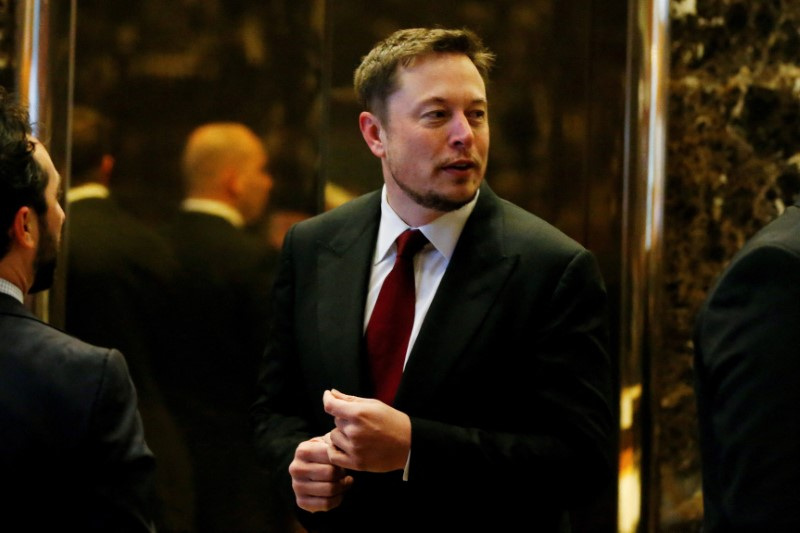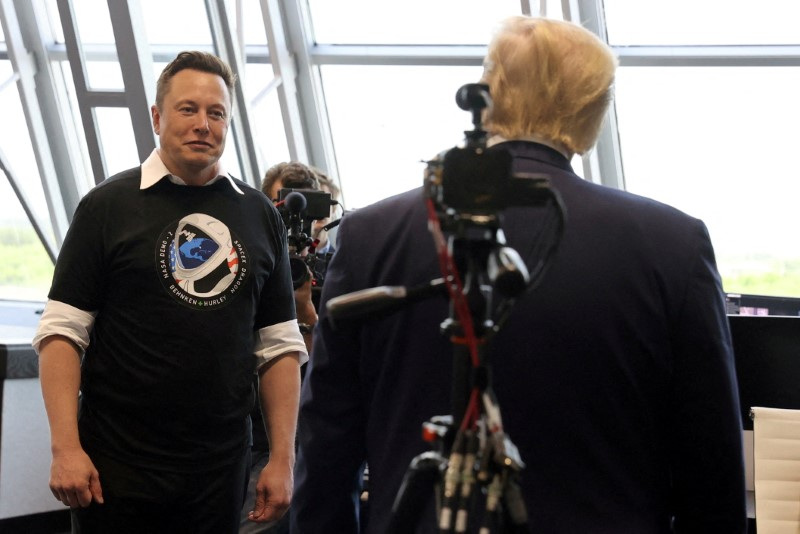By Chris Kirkham
(Reuters) - When Elon Musk endorsed Donald Trump for president last month, the Tesla (NASDAQ:TSLA) founder and chief executive backed a candidate who vows to "drill, baby, drill," "end the electric vehicle mandate" and reduce subsidies of the sort that helped Tesla become the U.S.'s dominant EV manufacturer.
So instrumental have government loans, tax breaks and other EV policies been to Tesla's fast growth that despite Musk's gradual embrace of the former president and his Republican Party rhetoric in recent years, the company continues to lobby the U.S. and state governments for benefits championed by the Democratic Party.
In February, for instance, Tesla in a filing with the U.S. Environmental Protection Agency, or EPA, urged the Biden administration to allow California to pursue stricter vehicle emissions rules than the rest of the country – an idea Trump opposes.
Months earlier, in a previous filing with the agency, Tesla lobbied the government for regulations that would ban the production of most new gasoline cars by 2035 – the so-called "EV mandate" that Trump and others on the American right have criticized.
The disparity is hardly the first time that the billionaire entrepreneur – himself increasingly dismissive of subsidies – has sent mixed signals on business and politics.
"Elon tends to say he's hostile to subsidies while Tesla is gobbling them up like a hungry Godzilla," said Mike Murphy, a Republican strategist who runs the EV Politics Project, a Los Angeles-based advocacy group that seeks bipartisan support for electric vehicles.
People familiar with Musk's management at the carmaker told Reuters his approach to subsidies is pragmatic, a willingness to accept public money if it's there for the taking. Musk's willingness to overlook outright Republican opposition to an industry he helped pioneer, meanwhile, signals a broader focus on goals that may not dovetail with the immediate interests of his businesses.
"Tesla is not the endgame for him," said Andrew Ward, a management professor at Lehigh University, noting Musk's holdings in sectors ranging from artificial intelligence to space exploration to neuroscience. Musk could "sacrifice some of the short-term interest in Tesla," Ward added, "if it'll satisfy the long-term interests of his ambitions."
Musk and Tesla didn't respond to requests from Reuters for comment. A spokesman for Trump didn't respond, either. A White House spokesman declined to comment.
The growing bond between Trump and Musk could be on display Monday night, when the Tesla boss is scheduled to interview the Republican candidate on X, Musk's social media platform.
It's unclear exactly what ambitions Musk could seek to advance through his increasingly vocal rejection of progressive platforms – from EV subsidies to identity politics.
His support for Trump, once tenuous, solidified in July, when Musk, after the failed assassination attempt against the former president, endorsed Trump and said he would fund a political action committee that federal records show has spent $21 million to support him and oppose the Democratic ticket.
Days after the endorsement, one user on X asked Musk if he would comment on Trump's views on EVs. "It will be fine," Musk responded.
Whatever Musk's endgame, the public record clearly shows that Tesla, since its founding over two decades ago, has benefitted from government assistance, largely because of its role in moving the U.S. toward cleaner cars. Tesla's first major manufacturing facility, in Fremont, California, was developed with the help of a $465 million loan from the U.S. Department of Energy, repaid three years later.
More recently, Tesla has reaped almost $9 billion since 2018 by selling what are known as "regulatory credits," securities filings show. The credits, awarded in the U.S. by the federal and state governments to manufacturers who surpass increasingly strict emissions rules, can be sold to other carmakers who are unable to comply.
"There was no Tesla without California's regulatory bodies," California Governor Gavin Newsom said at a 2022 conference, citing the importance of the state's credits to the carmaker's finances.
A Reuters review of Congressional lobbying records – and Tesla's public comments to federal and state regulators – shows that the company has continued working to shape public policy in favor of such benefits.
Earlier this year, in a February filing with the U.S. Department of the Treasury, Tesla said that sustained government support, by accelerating the transition away from fossil fuels, would "mitigate greenhouse gas emissions, and protect the country's public health and welfare."
"A SENSIBLE PERSON"
Musk once criticized Trump for dismissing the challenge of climate change.
In June 2017, five months into Trump's presidency, Musk quit White House advisory panels because the administration withdrew from the Paris Agreement, a landmark 2016 treaty meant to tackle climate issues globally. "Climate change is real," Musk wrote at the time. "Leaving Paris is not good for America or the world."
After Trump lost his 2020 reelection bid, Musk told Fortune magazine he was "super fired up" about President Joe Biden's climate-change agenda and optimistic "about the future of sustainable energy."
Musk soon soured, though, angry that the White House, in a well-documented episode, didn't invite Tesla to a 2021 gathering of EV makers. By December of that year, Musk distanced himself from Biden's initiatives and criticized plans for what would eventually become the Inflation Reduction Act, or IRA, a major economic stimulus package built in part upon subsidies for clean energy.
"I would just can this whole bill," Musk told the Wall Street Journal then, saying Tesla didn't need public money.
Since the law passed in August 2022, however, Tesla has sung a different tune. In formal comments to the Treasury and the Internal Revenue Service, the company praised the law and said it would seek "continuing engagement…to ensure these benefits of the IRA are fully realized."
Among other benefits under the law, EV buyers can get subsidies of up to $7,500 per vehicle if purchasers meet certain income requirements. Tesla has said that tax credits laid out in the law for battery manufacturing could generate as much as $250 million for the company per quarter. Musk himself, in a conference call last year, said the incentives "could be gigantic."
Other formal comments with various federal agencies have continued to seek government help. A July 2023 filing with the EPA appealed to sympathy for the downtrodden: Tesla lobbied the agency for stricter emissions limits to improve "poor air quality in many urban areas, including areas with vulnerable populations."
For Tesla, emissions controls aren't just about the environment.
By raising demand for regulatory credits among manufacturers of less efficient vehicles, stricter limits help Tesla continue to earn billions of dollars through sales of those credits to rivals, like General Motors (NYSE:GM) and Stellantis (NYSE:STLA). In the last quarter alone, sales of the credits generated $890 million for Tesla, according to a July securities filing. The company reported net income that quarter of $1.5 billion.
In an email, GM said it purchases such credits to keep up with changing market and regulatory conditions. A Stellantis spokesperson declined to comment on past credit purchases but said the company is no longer buying credits in the United States.
Trump has opposed stricter emissions rules and criticized subsidies for EV manufacturers. Shortly after endorsing the former president, Musk echoed the sentiment. "Take away the subsidies," he wrote on social media, a week before Tesla reported its $890 million credit windfall. "It will only help Tesla."
Some shareholders have disagreed. Ross Gerber, an outspoken investor whose firm as of the first quarter owned a roughly $58 million stake in the carmaker, told Reuters that Musk's support for the former president "is 100% contrary to his own personal financial interests" and those of "one of the most important companies for clean energy, which is Tesla."
In interviews, three former Tesla employees who worked on the company's public policy efforts told Reuters that what some see as contradiction is more of a tussle between ideology and pragmatism. As a proponent of free markets, they said, Musk is by nature opposed to most government intervention. If free money or other benefits become available, though, Tesla would be foolish not to take advantage of them.
"He's a very sensible person," one of the former employees said.
Still, Tesla's most recent lobbying efforts contradict Trump's discourse, like his repeated calls to "end the electric vehicle mandate." Although no such mandate exists, the Biden administration and states including California have sought to encourage a gradual phaseout of the production of vehicles that run on fossil fuels.
In its July 2023 filing with the EPA, Tesla called outright for an end to the manufacture of gasoline cars, calling the measure "essential" to address the "rapidly escalating climate crisis." Musk, for his part, has grown circumspect, writing on social media in June: "Climate change risk is overstated in the near-term, but probably accurate in the long-term."
The dissonance isn't limited to Musk's environmental views.
In a May 2022 filing with the California Air Resources Board, that state's emissions regulator, Tesla touted itself as "a leader in creating a diverse and inclusive workplace." Many of its employees, it said, hail "from communities that have long struggled to break through the historic roadblocks to equal opportunity." It wrote that "communities of color disproportionately bear the impacts of air pollution."
The filing came just days after Musk, increasingly disdainful of identity politics, made clear in a social media post that he could no longer support Democratic candidates. Democrats, he wrote at the time, are "the party of division & hate."

In the weeks since Vice President Kamala Harris succeeded Biden as the party's candidate for the White House, Musk has made his distaste for her bid clear. Last week, after an X user posted a video montage of Harris speaking about "equity" and "equality," Musk replied: "Kamala is quite literally a communist."
Joseph Costello, a Harris campaign spokesperson, in a statement said: "Trump is bought and paid for by extremist, anti-worker billionaires, and Elon knows that Trump will give him reckless tax handouts at the expense of the middle class."
